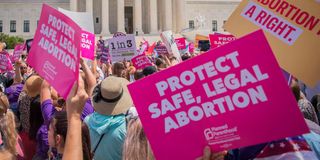Protect sexual violence survivors' right to safe abortion

Pro-life abortion protest in the US in this file photo. Local SRHR experts want the Kenyan government to acknowledge that survivors of sexual violence in need of, and qualify for safe abortion, should receive the service at the nearest possible health facility.
What you need to know:
- SRHR experts have decried the State’s failure to pronounce itself on access to safe abortion for the survivors of sexual violence.
- Those who need the service are forced to seek unsafe abortion which often leads to lifetime complications or death.
Sexual and reproductive health rights advocates have appealed to the government to safeguard sexual violence survivors’ right to access safe abortion.
Center for Reproductive Rights, Legal Strategies for Africa, associate director Martin Onyango, decried the State’s failure to pronounce itself on access to safe abortion for the survivors of sexual violence.
“Those who suffer from unsafe abortion are poor women and girls who rely primarily on the public health sector,” he said when he spoke to Nation.Africa on Monday.
He said those who need the service are forced to seek unsafe abortion which often leads to lifetime complications or death.
“The government needs to acknowledge that survivors of sexual violence who are in need and qualify for safe abortion should receive that service at the nearest possible health facility,” he said.
He proposed developing a policy that specifically addresses the model of access to safe abortion for the women and girls who need it.
“The direction needs to come from the public health leadership as to how, when, where, and who can access safe abortion,” he said.
Felony
He called on the government to update the Penal Code to align it with the Constitution.
Article 158 of the Penal Code punishes an individual with 14 years in jail for being guilty of a felony arising from unlawfully assisting a woman to procure an abortion.
Network for Adolescent and Youth Africa executive director, Victor Rasugu wondered why the government advocated more for post-abortion care than access to safe abortion.
He urged the government to reinstate Standards and Guidelines for Reducing Morbidity and Mortality from Unsafe Abortion in Kenya, which had been introduced in 2012 but withdrawn in 2014.
The document guided health professionals on how, when, and where to conduct abortion.
It allowed safe abortion to be performed by a trained and skilled health professional in health facilities that met minimum standards.
Abortion care
It presumed that by terminating the pregnancy, the providers would be acting in “good faith” and within the tenets of medical ethics of preventing harm.
Centre for Reproductive Rights, however, successfully challenged the withdrawal at a Nairobi High Court of Kenya. But Mr Rasugu, said they are yet to be reinstated since the court’s favourable ruling in 2019.
“The society needs to stop branding those who seek the service as murderers,” he noted.
Reproductive Health Network Kenya executive director, Nelly Munyasia, said lack of access to safe, affordable, timely and respectful abortion care, threatens the physical and mental well-being of women and girls.
“Unsafe abortion is financially expensive. They would spend Sh1, 000 to Sh2,000 to procure unsafe abortion but end up with complications that they treat for the rest of their lives,” observed Ms Munyasia.
Ipas Africa Alliance, policy and advocacy manager Suzanne Majani, said a government buy-in on access to abortion care would save women and girls from dying or enduring the lifetime complications of unsafe abortion.
“Reproductive health services have to be provided without fear or favour,” she told Nation.Africa.





